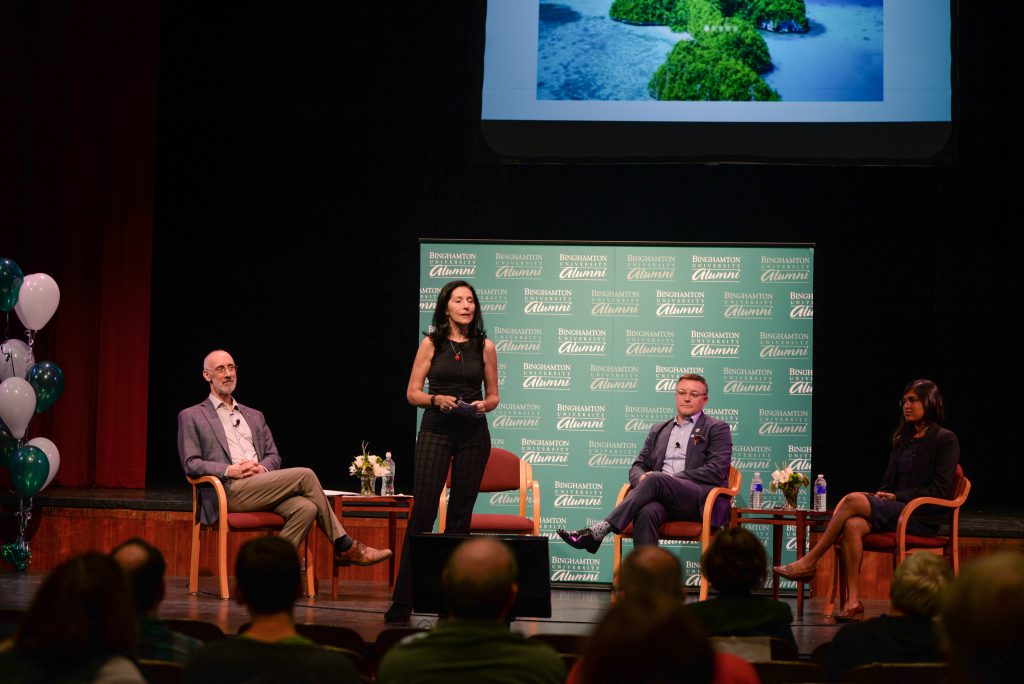
Three climate change experts and Binghamton University alumni gathered on Saturday to give a talk on localizing environmental impact and educating on the effects of global warming.
The Binghamton Alumni Association hosted its annual TIER Talk in Watters Theater. This year, the lecture discussed climate change and featured Amy Hyatt, ‘78, U.S. ambassador to the Republic of Palau; Seth Schultz, ‘01, special adviser on science and innovation to the Global Covenant of Mayors; and Tasfia Nayem, ‘14, master’s candidate at Duke University’s Nicolas School of the Environment and former climate change communicator at the Environment Protection Agency (EPA). The discussion was moderated by James Pitarresi, a professor of mechanical engineering.
According to the BU Alumni Association website, TIER Talks is a speaker series that encourages BU alumni and faculty to give their perspectives on current issues. Since its inception in 2014, the talks have focused on issues such as augmented reality, political polarization and the neuroscience of addiction.
Hyatt discussed her experience witnessing the effects of climate change on small island nations. Global warming comes with consequences such as rising sea levels, which endangers islands like Palau.
“We debate [climate change] here, and some people don’t believe in it,” Hyatt said. “It’s an academic debate, and that’s how I grew up thinking of it. But you live on these island nations and see it all around you — the consequences are very clear.”
According to Hyatt, islands like Palau are fighting climate change with education, teaching children about the importance of protecting the environment and the challenges it is facing. She also read an excerpt from a poem titled “Tell Them” by Kathy Jetnil-Kijiner, which speaks to the fear many residents of island nations have of losing their home.
“We’re teaching the children what they can do, and we’ve embedded [climate change] into the curriculum there,” Hyatt said.
Schultz spoke about his work for C40 Cities Climate Leadership Group, which connects the world’s top 90 cities in a network that shares ideas and information about how to combat climate change. The group represents more than 650 million people and a quarter of the world’s economy.
C40 has helped launch programs such as bike sharing in multiple major cities. However, according to Schultz, smaller cities such as Binghamton can also work to implement environmentally friendly programs.
“There are a bunch of different types of city networks out there,” Schultz said. “One is called ICLEI — it’s one of the oldest; it’s been around for about 20 years. There’s another in the U.S.; it’s called the Urban Sustainability Director’s Network. Directors of sustainability for cities of all sizes in the U.S. coordinate with each other, so there’s a ton of stuff for smaller cities.”
Nayem originally intended to speak about her work at the EPA, but said many of the projects she previously worked on have been discontinued in the past year under President Donald Trump’s administration. Instead, she focused on the importance of talking about climate change.
“Studies have found that Americans mention their own family and friends have the greatest ability to convince them to take action to reduce global warming,” Nayem said. “You don’t have to be a scientist. One of the top reasons people don’t talk about climate change is because they don’t know all the science. But you don’t need to know all the science. Studies have shown it’s more effective to use your own voice to explain how it relates to you.”
According to Nayem, climate change is a challenge that comes with opportunities to make the world a better place.
“I see climate change as a way to think critically about our legacy and how we want to live on this planet,” Nayem said. “I see it as an opportunity to be really creative and strategic about how we address [issues] individually and collectively, and I see it as a way to address the inequities that exist.”
Elizabeth Nutig, an undeclared sophomore, said she came away from the talk with a better understanding of climate change and how to combat it on an individual level.
“I didn’t really realize how important talking about climate change is because you always hear about [what] scientists can do or big politicians,” Nutig said.


